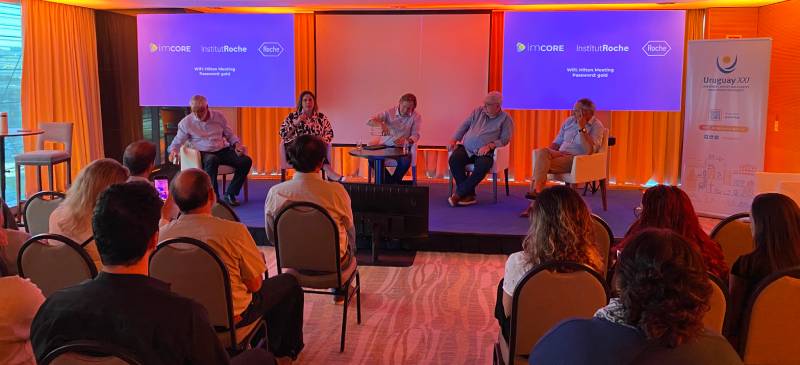- Home
- About us
- News
- Events
- EXPORT Export
-
BUY
Buy
BuyBuyFood and beverage Beef Caviar Dairy Products Fruits Healthy foods Olive oil Processed Foods Rice Sweets, honey and jams Wines ICT Software development Technology products
- INVEST Invest
- COUNTRY BRAND Country Brand
-
INFORMATION CENTER
Information center
InformationCenterInformationCenterReports Country reports Department reports Foreign trade reports Product-Destination worksheet Sectors reports Work documentsStatistical information Classification Uruguay XXI Exports Imports Innovative National Effort Macroeconomic Monitor Tools Buyers Exporters Investors
- Contact
-
Languages
“I see Uruguay as an R&D hub for the future.”
Institut Roche’s first Research Camp outside Europe was held in Uruguay and reaffirmed the strength of the country’s scientific community and innovation capacity.
Share:

Uruguay is positioned on the global map as a research and development center after Institut Roche chose it to host its first Research Camp outside Europe. This milestone recognized Uruguay’s tradition of excellence in scientific research and highlighted its strength as an innovative market in Latin America.
Research Camp 2024, the largest organized by the prestigious research center, took place in Punta del Este and Montevideo. Approximately 70 researchers from various countries, including members of the Roche Institute and scientific startups, gathered to address complex scientific challenges from different disciplines and to find solutions.
“This is the first time we have held the meeting south of Ecuador and the first time in Latin America. I think this speaks of the strength of Uruguay and how much it has achieved so far, which allows us to come and have not only a successful camp but probably the best Camp we have ever had”, reflected the Scientific Project Manager at Institut Roche, Cameron MacPherson.
The expert also highlighted Uruguay’s strategic position in research and development. “I definitely see Uruguay as an R&D hub for the future. I think it has many aspects in its favor. It is a relatively small country, which almost ironically means it can probably achieve much more per capita than many other countries. So, from a strategic position, Uruguay is well positioned to take the lead and demonstrate much value,” he said.
The selection of Uruguay as host underscored confidence in its ability to serve as a business and innovation hub, tapping into emerging talent locally and from across the region.
Institut Roche General Manager Magnus Fontes, responsible for organizing these camps, highlighted Uruguay’s stability, security, education, and global openness as decisive factors for its choice. “I see clear opportunities for Uruguay,” he said, and he also emphasized the country’s predisposition to collaborate internationally, a characteristic that he considered essential to promote investments and establish business in the scientific field.
Fontes shared his enthusiasm for the experience lived during the Camp, describing it as exceptional and highlighting the cooperation of the local community and various stakeholders such as the Serrapilheira Institute and the Institute of Pure and Applied Mathematics of Brazil, as well as the Program for the Development of Basic Sciences (Pedeciba) in Uruguay, which participated in the selection of young scientific talent.
The Canadian co-founder and CTO of DNAstack, Miro Cupak, valued the adaptability and level of the participants. “One thing that really surprised me is how advanced all these scientists were and how quickly they could get up to speed with a complex computational model. We made much progress in the last few weeks and were able to work with amazing scientists from Uruguay,” he commented.
According to all participants, the impact of the Research Camp was deeply felt with the creation of new scientific collaborations and significant findings in the five use cases that were addressed.
Uruguayan Pablo Musé, co-founder of Digital Sense and professor at the University of the Republic, highlighted the interdisciplinary approach and the “perfect opportunity” to showcase Uruguayan talent. “There is good raw material regarding training and people,” he assured.
“The idea was to mix the experience of biologists and physicians with people from the area of engineering and mathematics to be able to apply methods to reach conclusions about genetic data, which are very abundant, and a battery of algorithms is needed to process them and reach useful information that can have an impact on the future of health,” he explained.
In addition to scientific achievements, the presence in the Camp of other companies, including Microsoft AI Co-Innovation Lab, highlighted Uruguay’s openness to collaboration between academic institutions and the business sector. The participation of these companies in federated learning projects underscored Uruguay’s ability to attract and facilitate collaborative research in advanced technologies.
Manager of the Microsoft AI Co-Innovation Lab in Uruguay, Elianne Elbaum, praised the push in Uruguay toward public-private collaboration.
“I saw amazing researchers at the camp and thought this was the place for Microsoft to help advance science,” she said. She also highlighted the country’s progress: “We always talk about Uruguay as the country with great potential, but I see that its potential unfolding now. I see the results of many government investments in innovation and attracting investment, and I see many agencies working towards this goal. It is really happening.
The successful execution of this Research Camp in Uruguay bodes well for the future of scientific innovation in the region. This event marks the beginning of an era in which Uruguay firmly establishes itself as an attractive destination for foreign companies and local startups, boosting the R&D ecosystem and consolidating its reputation as an innovation hub in Latin America.
